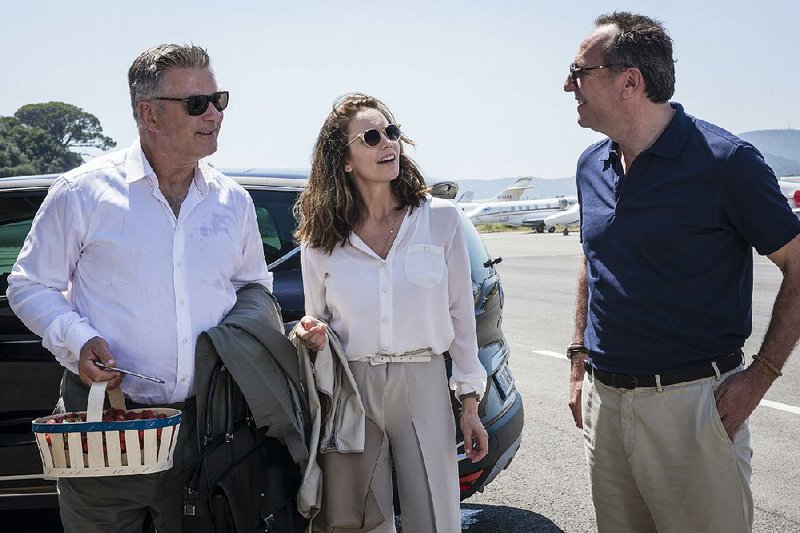It is with genuine sadness to report that Paris Can Wait is a snore.
We were hopeful, in part because the world needs more movies starring Diane Lane, and because we were impressed by Hearts of Darkness: A Filmmaker's Apocalypse, the 1991 documentary on the making of Apocalypse Now that was Eleanor (the 81-year-old wife of Francis, mother of Sofia) Coppola's best-known film credit prior to the current film, which is her feature film debut. (Most of the movies she has made are documentary supplements to the movies made by her famous husband and daughter; she also has written two books that have established her as the chief historian of the Coppola clan.)
Paris Can Wait
78 Cast: Diane Lane, Arnaud Viard, Alec Baldwin
Director: Eleanor Coppola
Rating: PG, for thematic elements, smoking and some language
Running time: 1 hour, 32 minutes
Mrs. Coppola based the movie on an adventure she had in 2009 when, after an illness prevented her from flying with her husband, his shambolic French business associate volunteered to drive her from the Cannes Film Festival to Paris. The 8 1/2-hour drive took them 2 1/2 days, with lots of stops for art, wine and culinary tourism.
But what makes for a charming anecdote doesn't translate to the screen, not even with luminous Lane as Anne, the wife of busy and apparently inattentive Hollywood producer Michael (Alec Baldwin, the go-to for busy, inattentive business types), who finds herself at loose ends. Her boutique dress shop has closed and her college-bound daughter is about to turn 19 and doesn't rely on her as heavily as before.
Though she's early on described as an "interesting woman," her prime character trait seems to be an infatuation with the high end Leica C (which is a more expensive rebranded version of the Lumix LF1) point-and-shoot camera she uses to snap Pinterest-worthy shots documenting her gustatory dalliances, details of various artworks, and her companion, the awkwardly insinuating Jacques (Arnaud Viard) who kinda/sorta is interested in seducing Anne. Because he is French, as Michael says, with "no scruples about married women."
Jacques est tres French, which apparently means he's a terrible driver and indifferent to practical details. When he first proposes driving Anne to Paris, he mentions a meeting he has there in the morning, which would seem to indicate some urgency on his part. But as soon as they embark -- in a battered Peugeot convertible that services the cliched idea of the French automobile the same way the Jacques character services the cliched idea of the French man -- he seems to forget all about his meeting, though later we'll hear him shouting about l'argent on his cellphone.
(Because Anne's character doesn't speak any French, which seems odd -- given her social and economic privilege we might expect her to be able to read a menu -- the film doesn't employ subtitles. This humbles those of us who imagine we speak the language un peu; I was only able to pick up a few words here and there.)
The film begins promisingly enough, with Anne understandably uncomfortable in the presence of the overly familiar Jacques, who needs to francais-splain the universe to the uptight Anne. But the first dinner scene goes on far too long, and the film never recovers from this off-footing. Anne never really warms to Jacques, and he never really becomes worthy of our empathy. All his talk about enjoying life -- eat what you like, drink what you like, he admonishes her as they sit amid what we imagine are hundreds of euros' worth of gilded plates -- comes across as a smarmy attempt to win her affection.
But maybe there's more to Jacques? Well, the movie makes a nominal effort to get you to think so, but in the end he just seems a little pathetic.
And Anne, well, she's beautiful and that's supposed to be enough for her to enlist our empathy. To be fair, it's a strategy that has worked for Lane in better movies such as Unfaithful and Under the Tuscan Sun and in her film debut, 1979's A Little Romance, a Gallic fantasy directed by George Roy Hill in which she played a 13-year-old American girl who runs off to Italy with the 13-year-old son of a Paris cab driver.
With neither of the main characters substantial enough to hold our interest -- Baldwin checks out midway through the first act and only returns as a voice on a cellphone -- it falls to a travelogue of Provence and Burgundy to hold our interest. And it doesn't, though you might feel the need for a sympathetic antacid after watching Anne and Jacques dawdle over their poisson and brulee. More than once the movie causes us to wonder exactly what laws the French have enacted against drunken driving.
Is it really that bad? Well, maybe not. The cinematography is nice, and the Paris apartment Anne eventually ends up in looks like a real place rather than a sound stage. But there are several failures on display -- the movie is badly written, and Viard, a fine actor in other circumstances, is badly miscast. Lane appears to be trying, and on one level Anne's uncomfortable onscreen relationship with Jacques is realistic; it's just that she's often compelled by the script to pretend she likes the creep.
It's tempting to make the comparison between Paris Can Wait and the Steve Coogan-Rob Brydon Trip phenomenon. But Coogan and Brydon are smart, witty and credible frenemies. Anne and Jacques come across as vapid brats whose company you're happy to escape. Like the journey it chronicles, Paris Can Wait goes on too long.
MovieStyle on 06/16/2017
